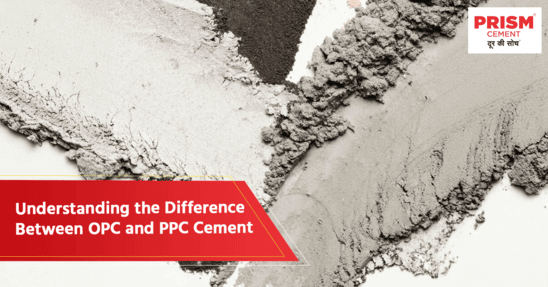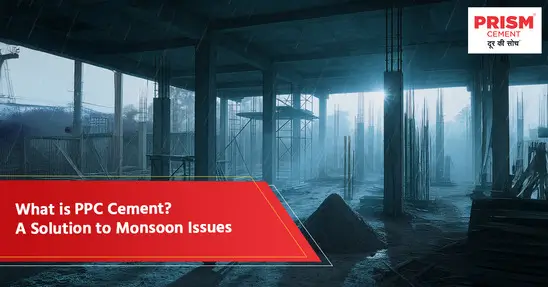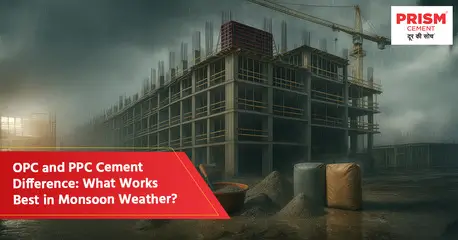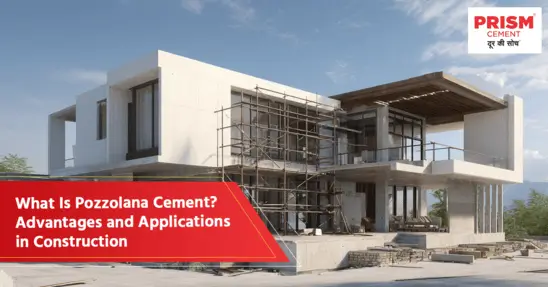When it comes to construction, selecting the right cement is crucial for ensuring strength, durability and long-term performance. The most commonly used types are OPC and PPC cement, each suited for different construction requirements. Understanding the OPC and PPC cement differences can help you make an informed decision and achieve the optimal results for your project.
In this blog, we’ll explore the characteristics of Ordinary Portland Cement (OPC) and Portland Pozzolana Cement (PPC), their advantages and application.
Importance of Understanding the Types of Cement
Cement is the backbone of modern construction, serving as the binding material in concrete and mortar. Choosing the wrong type of cement can lead to structural inefficiencies, increased costs or reduced durability. By understanding the properties and applications of cement products, namely OPC and PPC, you can ensure optimal performance and cost-effectiveness for your project.
What is OPC Cement?
Ordinary Portland Cement (OPC) is one of the most used cements for construction worldwide. It is manufactured by grinding a mixture of limestone, clay and other minerals, and then heating it to form clinker. Clinker is then ground into a fine powder with added gypsum, resulting in OPC.
Key Features of OPC:
- Fast Setting Time: OPC sets quickly, making it ideal for projects requiring rapid completion
- High Initial Strength: Ideal for high-strength applications such as bridges, skyscrapers, and dams
- Widely Available: OPC is readily available in the market, making it a convenient choice for general-purpose construction
While OPC offers several benefits, its high heat of hydration makes it less suitable for large-scale concrete pours, as it can lead to shrinkage or cracks.
What is PPC Cement?
Portland Pozzolana Cement (PPC) is a blended cement made by mixing Ordinary Portland Cement (OPC) with pozzolanic materials such as fly ash, silica fumes or volcanic ash. These materials enhance the performance and sustainability of the cement.
Key Features of PPC:
- Durability: PPC provides excellent resistance to chemical attacks, moisture and sulphates, making it ideal for long-term projects
- Eco-Friendly: By incorporating industrial by-products, such as fly ash, PPC reduces the carbon footprint of cement production
- All-Weather Performance: PPC performs well in diverse climatic conditions, making it a reliable all-weather cement
- Cost-Effective: PPC is often more affordable than OPC, offering superior value for money
With various types of PPC cement available, it is a preferred choice for residential and eco-friendly construction projects.
Advantages of Using PPC Cement
PPC cement offers several advantages that make it a top choice for construction:
- Improved Workability: Its fine particles and composition ensure smoother application in plastering and masonry
- Reduced Heat of Hydration: Minimizes shrinkage cracks, ensuring long-term structural integrity
- Increased Strength Over Time: PPC gains strength gradually, making structures more robust over the years
- Water Resistance: Offers excellent moisture resistance, preventing water seepage and related damage
- Sustainability: Utilizes industrial wastes, such as fly ash, contributing to circular economy and environmental conservation
These advantages position PPC as good quality cement for residential, industrial and infrastructure projects.
When to Use OPC vs. PPC Cement?
The OPC and PPC cement difference lies in their composition, properties and applications. Here’s when to use each:
When to Use OPC :
- Speed is Critical: OPC’s quick setting time makes it ideal for fast-track projects
- High Strength Required: Suitable for high-load structures like bridges, dams and industrial buildings
- Dry Ambient Conditions Dry: OPC performs well in dry climates without excessive moisture
When to Use PPC :
- Durability is a Priority: PPC is perfect for projects exposed to moisture, sulphates and chemicals, such as coastal structures and sewage systems
- Eco-Friendly Construction is Required: PPC’s sustainable production process aligns with green building practices
- Residential Construction: PPC is often considered as the best quality cement for home construction due to its long-term benefits and affordability
Understanding these distinctions ensures you select the right cement products for your specific needs.
How to Research Cement Online?
Researching cement online can help you make informed decisions for your construction needs. Here’s how to go about it:
- Explore Reputed Manufacturers: Focus on well-established manufacturers known for high-quality cement, such as Prism Cement
- Compare Cement Types: Review the specifications and features of different types like PPC and OPC to identify the best fit for your requirements
- Check Certifications: Ensure the cement meets recognized standards such as BIS and ISO for quality assurance
- Read Customer Feedback: Customer reviews and ratings can provide valuable insights about product performance and satisfaction levels
- Find Local Dealers: Use online resources to identify nearby dealers or suppliers who offer the type of cement you are looking for
Thorough research ensures that you select the right cement for your project with confidence.
Conclusion
Choosing between OPC and PPC cement depends on your construction needs. OPC is ideal for high-strength and fast-track applications, while PPC provides enhanced durability, workability and eco-friendliness. Understanding these differences is essential for ensuring the success of your project.
For most residential and sustainable projects, PPC cement is a top choice due to its versatility, cost-effectiveness and long-term performance.
Prism Cement offers a range of high-performance products, including Prism Champion All Weather Cement, known for its rapid strength gain, excellent workability and water resistance, making it ideal for both large-scale and precise projects.
When planning your next project, take the time to compare options to find the best prices, types, and certifications. Choose the right cement for a structure that lasts!




